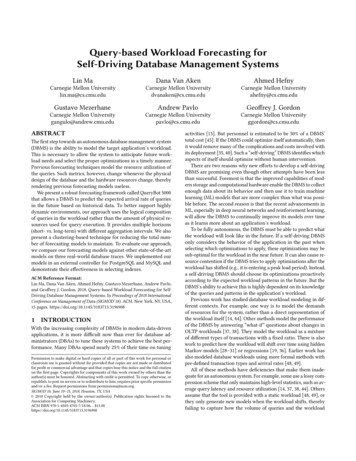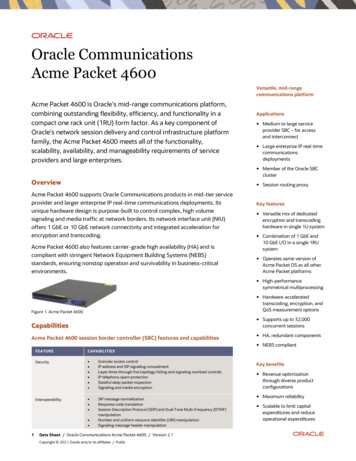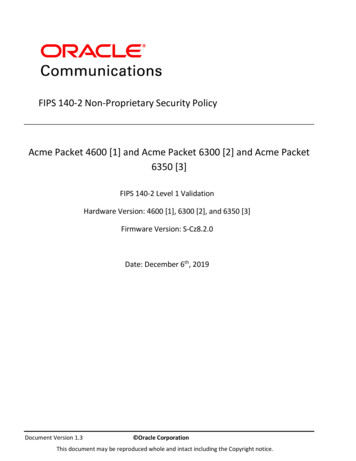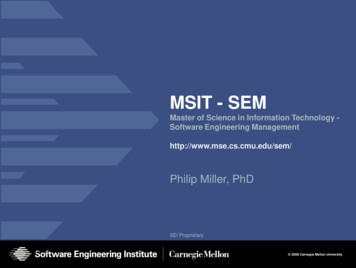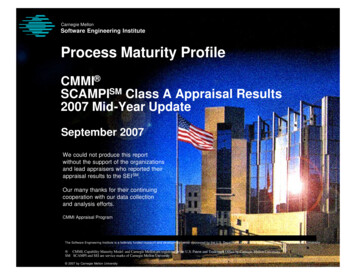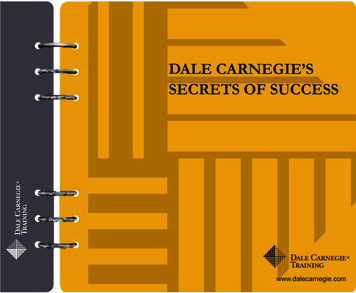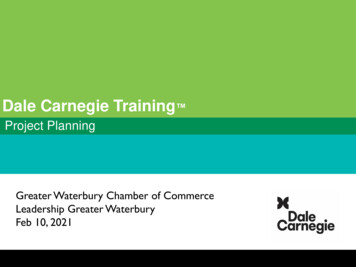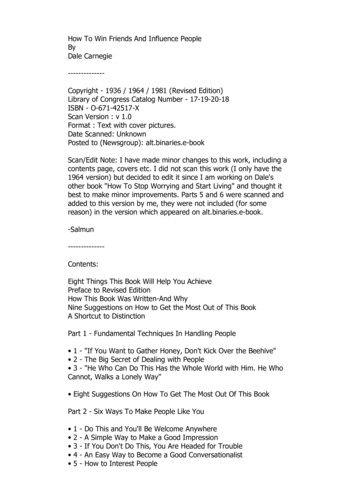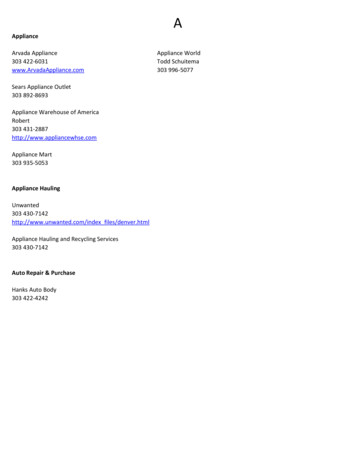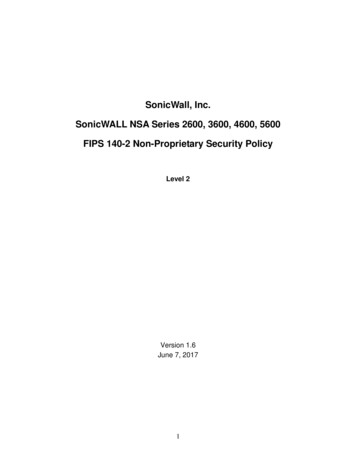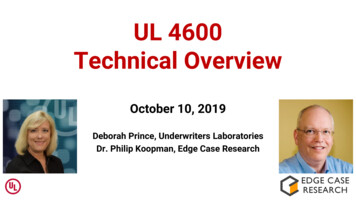
Transcription
UL 4600Technical OverviewOctober 10, 2019Deborah Prince, Underwriters LaboratoriesDr. Philip Koopman, Edge Case Research1
Webinar GoalsUL 4600: Standard for Safety for theEvaluation of Autonomous Products Overview for technical stakeholders Comments due Friday November 1 Goals for this Webinar Orientation to standard for technical audience Key principles to keep in mind when commenting How to get a copy and submit comments Q&A2
Why UL? Underwriters Laboratories:working for a Safer World for 125 years Published first safety standard in 1903Focus on research, education, and more than 1,700 standards UL’s Standards Development processConsensus process Open, transparent, and timely Continuous standards maintenance 3
UL 4600 Standards Technical Panel (STP) STP is the voting consensus body4
Timeline Initial drafting July 2018: Announced intent to develop UL 4600 STP revisions June 2019: STP meeting to discuss first full draft Three rounds of STP comment & draft revisions completed Stakeholder comments Oct 2019: Stakeholder preliminary draft available Stakeholder comments due Nov 1, 2019 Target final version release Q1 20205
Technical Overview Orientation to current preview draft version Contents and organization subject to change! UL 4600 Scope Fully Autonomous Vehicle (AV) operation No human driver/supervisor Main principles Safety case is front and center Guide to review & comments 2019 Philip Koopman6
UL 4600 Key Ideas Goal: structured way to argue that AV sufficiently safe Non-prescriptive, safety case approach Trace all safety goals (claims) to evidence Checks and balances (self-audit and independent) Monitoring and feedback Detect invalid assumptions & gaps in coverage System Level Life Cycle approach Includes fault recovery, supply chain issues, expected misuse Reference lists to improve completeness Prompts & epistemic defeaters for coverage (#DidYouThinkofThat?) Ability to argue that some prompts aren’t applicable 2019 Philip Koopman 7
Why UL 4600? Autonomous systems have unique needs No human supervision, non-determinism, This version: highly automated vehicles System level approach needed Functional safety, SOTIF, road tests, simulation all play a role– But need a framework to put the pieces together Adapt as technology evolves Cooperate rather than compete Can accept work products from ISO 26262, ISO/PAS 21448, etc. Goal: guidance on “Is system engineering rigor sufficient?” 2019 Philip Koopman8
Goal Based Approach Traditional safety standards are prescriptive “Here is how to do safety” (process, work products)– ISO 26262, ISO/PAS 21448, IEC 61508, MIL-STD 882, etc. But, we’re still figuring out some aspects of AV safety UL 4600 is goal based: “be acceptably safe” Use a Safety Case to argue system is acceptably safe– Define what safe means; argue that AV meets that definition– Do NOT prescribe any particular engineering approach– DO require a set of minimum acceptable topics for safety case Require use of any good system engineering process (not just V) 2019 Philip Koopman9
What’s A Safety Case? A structured argument backed by evidence Notation agnostic / use any reasonable notation SubGoal/Claim: “AV will not hit pedestrians” Hypothetical Arguments– “AV will detect pedestrians of all types”– “AV will stop or avoid collision detected pedestrians”– “We have identified & mitigated risks caused bydifficult to detect pedestrians” Hypothetical Evidence– “Here are results of detect & avoid tests”– “Here is analysis of coverage of different types of pedestrians”– “Reliability growth data shows high pedestrian coverage” 2019 Philip Koopman 10
UL 4600 Scope System level safety for autonomous operation & lifecycle 2019 Philip Koopman11
Out of Scope for UL 4600 Related topics ADAS features AV testing safety (but, see BSI/PAS 1881) Ethical guidelines (but, see IEEE P7009) Human factors Human attention (as driver; as safety supervisor) How to argue humans will behave as required How to argue human safety supervisor will react correctly Details of security Requires security plan; maps security plan to safety Does not attempt to define what is in security plan 2019 Philip Koopman 12
Prompt Elements: #DidYouThinkofThat? Extensive lists of safety case topics, hazards, etc. Good practices & Pitfalls (lessons learned & bad practices to avoid) Prompts must be considered, not necessarily adopted Mandatory: you have to do this Required: can deviate ONLY if inherently inapplicable– E.g., if no machine learning, then can deviate from ML requirements Highly Recommended: can deviate with non-trivial rationaleRecommended: entirely optionalExamples: illustrative reminders; do not have to address each one Many processes and technique areas are lightly constrained E.g., Identify hazards, but use any reasonable technique 2019 Philip Koopman13
Operational Design Domain (ODD) Define relevant ODD considering: Infrastructure Weather & road conditions Object & event ontology Own and other vehicle conditions many other things Exiting ODD must be safe Due to environment change (unexpected snow) Due to ODD ontology gap (“what the heck is that?”) Due to equipment failure (potentially using degraded modes) 2019 Philip Koopman14
UL 4600 ODD Prompt Excerpts Travel infrastructure Support infrastructure, if any is relied upon EXAMPLES: types of road surfaces, roadgeometries, bridge restrictionsObject coverage (i.e., objects within ODD)Event coverageEXAMPLES: interactions with infrastructureBehavioral rulesEXAMPLES: traffic laws, system path conflictresolution priority, local customs, justifiable rulebreaking for safetyEnvironmental effectsEXAMPLES: weather, illuminationVulnerable populationsEXAMPLES: pedestrians, motorcycles, bikes,scooters, other at-risk road users, other road usersSeasonal effectsEXAMPLES: foliage changes, sun angle changes,seasonally-linked events (e.g., Oktoberfest) EXAMPLES: types of traffic signs, travel pathgeometry restrictions, other markingsLocalization support, if relied uponEXAMPLES: GNSS availability, types of navigationmarkers, DSRC, other navaidsCompliance strategy for traffic rulesEXAMPLE: enumeration of applicable trafficregulations and ego vehicle behavioral constraintsSpecial road user rulesEXAMPLES: bicycles, motorcycles/lane splitting,construction systems, oversize systems,snowplows, sand/salt trucks, emergency responsesystems, street sweepers, horse-drawn systemsRoad obstructionsEXAMPLES: pedestrian zone barriers, crowdcontrol barriers, police vehicles intentionallyblocking traffic, post-collision vehicles andassociate debris, other road debris, other artificialobstructions 2019 Philip Koopman 15
Autonomy Autonomy Pipeline candidate best practices & pitfalls Sensing(e.g., correlated sensor faults) Perception(e.g., brittle perception, ontology gaps) Machine learning(e.g., overfitting) Planning(e.g., plan exceeds vehicle capability) Prediction(e.g., mis-predictions, sudden changes) Trajectory & control(e.g., degraded vehicle capabilities) Timing(e.g., loss of control loop stability) 2019 Philip Koopman16
System, Environment, Lifecycle “Item” covered by safety case includes safety related: Autonomy (sensors, algorithms, actuators) Vehicle (safety related within autonomy purview) Maintenance and inspection procedures Lifecycle issues and supply chain Data sources and feeds, including maps, ML training Assumptions & supporting requirements ODD characterization Road infrastructure support Procedural support (e.g., safety related inspections) 2019 Philip Koopman17
Maintenance & Inspections Safety related maintenance What maintenance is required for safety? Are procedures documented? How do you know it is done effectively?https://bit.ly/2IKlZJ9 Safety related inspections What/when are inspections required? Detection of vehicle & infrastructure problems (e.g., loose wheel) Are you trusting casual passengers with life critical inspections?– (Really? Is that a good idea?) 2019 Philip Koopman18
Lifecycle & Supply Chain Item has valid safety case at all times once deployed Safety related aspects of lifecycle Requirements/design/ML training Handoff to manufacturing Manufacturing & deployment Supply chain Field modifications & updates Operation Retirement & disposalIs sensor cleaning fluid life critical? Update distribution & integrity Version control & configuration management 2019 Philip Koopman 19https://bit.ly/2VavsjM
Role of Humans There is no “captain of the ship” Autonomy must assume responsibility Interacting with people Occupants, cargo loading Pedestrians & mobility device users Other drivers Special populations Misuse, pranks, malfeasance Safety related lifecycle participants Inspection & maintenance accuracy Safety culture for all stakeholdershttps://bit.ly/2GvDkUNIs it safe to drive now? 2019 Philip Koopman20
Black Swans & Unknowns Inductive proofs are never complete The black swan problem –you don’t know what you don’t know Addressed via: Extensive use of prompts for better coverageEvery observed swan is white. Epistemic defeaters (e.g., pitfalls)Therefore all swans are white. Monitoring required for assumptions and unknowns Deploying with uncertainty You will deploy believing you are acceptably safe Use monitoring to reduce margin of belief uncertainty 2019 Philip Koopman21
Assessment: Trust and Verify Self-audit Audit safety case for completeness Check technical aspects for reasonableness In close collaboration with the development team Independent assessor Independence from developer & competence must be documented Check and balance on self-audit NOT expected to find technical defects Developers must “own” safety Audits & assessments serve as a check and balance 2019 Philip Koopman22
Feedback Loops Feedback used to mitigate risk of unknowns Within product: incidents trigger safety case update At Assessment: updates trigger assessments Standards Process: emergent issues trigger yearly standard update 2019 Philip Koopman23
Component Assessment Generalized idea of System Element out of Context (SEooC) Hardware and/or software Idea: design-by-contractcomponent interface Assured properties (services; functions)Assumptions made by component– Must match promises made by system Component assurance context– Fault model– Subset of UL 4600 clauses assessed Can assess SEooC conformance independent of system 2019 Philip Koopman24
Change & Impact Analysis Continual changes System functionality update Different ODD (changing ODD scope; surprises) Assessment in response to changes: Impact analysis If required: Update safety case If safety case updated: Update self-audit If “big” safety case change: Independent Assessment update “Size” of change relates to safety case, not lines of code Impact analysis informs scope of self-audit/assessments 2019 Philip Koopman25
Prompt Elements vs. Integrity Levels Prompt element deviation categories: Mandatory / Required / Highly Recommended / Recommended– E.g.: “REQUIRED” can only deviate if intrinsically inapplicable Integrity levels Define at least two integrity levels: life critical & injury– OK to adopt more and/or existing levels (e.g., ASIL, SIL, DAL) Define level of rigor/technique use based on integrity level Example: Static analysis Required that static analysis is used to some degree Coverage, tools, tool settings based on Integrity level 2019 Philip Koopman26
How UL 4600 Works with Others ISO 26262 – starting point Still relevant to the extent it can be applied Assumes traceability of tests to design with “V” ISO/PAS 21448 & SaFAD – more guidance Design and validation process framework UL 4600 – #DidYouThinkofThat?Unusual pedestrian clothing Provides a template for technical safety report Minimum criteria for complete coverage feedback requirement Lists of positive and negative lessons learned Objective assessment criteria for safety case 2019 Philip Koopman27
UL 4600 Chapter Short Titles Organized by practitioner skill set1. Preface2. Scope3. References4. Terms5. Safety case & arguments6. Risk assessment7. Humans & road users8. Autonomy9. Software & systemengineering10. Dependability11. Data & networking12. Verification & validation13. Tool qualification14. Lifecycle concerns15. Maintenance16. Metrics17. Assessment 2019 Philip Koopman28
Anticipated UL 4600 Technical Benefits Catalog of best practices: #DidYouThinkofThat? Avoid missed hazardsUL4600.com Avoid pitfalls Mechanism for industry to share without sharing detailed data Objective, repeatable independent assessment Self-audit is first level of checks and balances– Feedback identifies surprises/gaps Independent assessment is about well-formed safety case– Not subjective opinion about whether developer tried hard enough– Prompt elements provide a safety case coverage floor– But, developer assumes burden for safety 2019 Philip Koopman29
Get Involved: Submit Comments Commenting requires registering as stakeholder E-mail to: Deborah.Prince@ul.com Use supplied spreadsheet for consideration Please make as concrete & actionable as possible30
Comments & Timeline Official version & comment spreadsheet via UL CSDS Other public materials and draft at: UL4600.com Timeline: Comments due Friday Nov 1st via CSDS upload Potentially voting draft in December Target for approved standard: Q1 2020. Will Stakeholder names be public? Stakeholder list itself is private However, all preliminary review comments are public & attributedto commenter31
Generalized idea of System Element out of Context (SEooC) Hardware and/or software Idea: design-by-contract component interface Assured properties (services; functions) Assumptions made by component - Must match promises made by system Component assurance context - Fault model - Subset of UL 4600 clauses assessed
